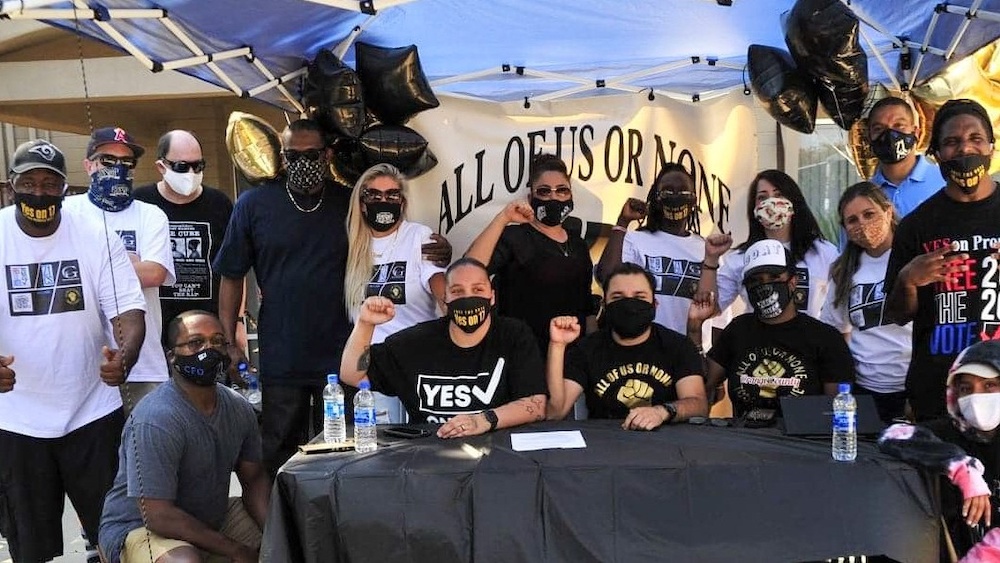If you’re interested in sharing your opinion on any cultural, political or personal topic, create an account here and check out our how-to post to learn more.
____
The first time I voted, I was 34 years old. My late arrival at the ballot box wasn’t because I didn’t care about politics or what happened in my community; it was because as someone who was imprisoned from the age of 19 to the age of 31 and on parole until I was 34, the election taking place that year was the first one I could finally vote in.
In California, parolees are barred from voting. Nevermind that parole can last a few years or a lifetime, or that Californians on probation and in county jail can vote — if you’re on parole and working hard, paying taxes and raising a family, you have to watch the world around you make all the decisions about your future.
California’s Proposition 17, on the ballot now, gives our state the opportunity to restore voting rights to 50,000 Californians who have completed their sentences and are on parole. These are people like my coworker Tariq, who turned 50 in August but has never had the chance to vote. People like my friend Catfish, who wasn’t able to cast his first vote until he turned 69. They did everything in their power to become productive citizens. But voting — the most productive, democratic act of all — remained off limits.
I’ve heard the counter argument. They committed a crime, some people say. Why should they be able to vote? Because “they” are also people like me: now a great-grandfather who employs 27 people and has worked for 40 years on human rights issues. They’re people like my friend Dominique, who is a mother, an essential worker and a student. They’re people like William, who believes so strongly in helping kids create a bright future for themselves and their communities that he has dedicated his life to mentoring. They work as hard and pay as much in taxes as anyone, love their kids as much as anyone, and dream up ideas that are as brilliant as anyone’s. Denying them the ability to fully participate in the democratic process is beneath the dignity of our country, our state and our selves.
Let’s be clear about what “parole” is. It was never intended to be an extension of a punishment. Even if you believe it should be, that’s not what California law says. According to the state Supreme Court, a person has paid their debt to society upon completion of their prison sentence. Parole is a time for formerly incarcerated individuals to reintegrate with their communities and create new bonds that will tether them to the responsibilities and privileges of belonging. And when paired with a restoration of voting rights, it works: In the 20 states where people on parole can vote, the recidivism rate — the likelihood that someone will commit a new crime — is lower than that of California.
On this issue, California — so often a leader in living by our values — has lost its way. A full 75% of those imprisoned in our state are Black or brown, making this policy little more than codified voter suppression and perpetuated systemic racism. If an entire community loses its electoral power, critical voices are silenced in a so-called democratic process.
In fact, that’s how this type of policy began in the Reconstruction Era: racism. No sooner were African American men granted the right to vote in 1870 than Southern states began changing the rules to disenfranchise them. A Florida Supreme Court case in the 1880s decided that petty larceny — stealing a chicken, or even just 10 cents — was enough to take away a person’s right to vote. Black voters were rounded up in mass numbers before an election, charged with larceny and disenfranchised. Those seeds of voter suppression have grown into a system that, today, disenfranchises more than 6 million Americans. It is a system that, consequently, traps Black and brown men and women into a cycle of generational poverty and disadvantage — and continues to deny them the vote, sometimes for life.
Even this proposition itself is a vote they are not able to cast. Imagine sitting around and listening to millions debate the value of your voice and waiting for them to decide your ability to vote.
Proposition 17 gives us a chance to right a systemic injustice — and rarely do we get the chance to do that with a simple vote. It won’t change everything, and we will still have much work to do on the roots of racism and inequity that have put so many Black and brown men and women in the criminal justice system in the first place. But the image of America that we should all strive to embody is one of fairness and justice. By voting YES on Proposition 17, we can take a step closer to living up to those ideals.
____
Dorsey Nunn is the Executive Director of Legal Services for Prisoners with Children. He is the first formerly incarcerated director of a public interest law office in California and has been instrumental in legal victories such as ending long-term solitary confinement in California, and policy victories including numerous Ban the Box laws passed at the local, state, and federal levels; the end of shackling of pregnant women; and the biggest drug sentencing reform passed by the CA legislature in recent history (SB 180).

